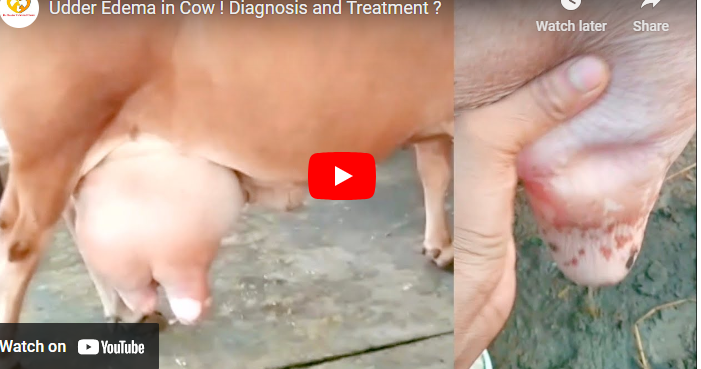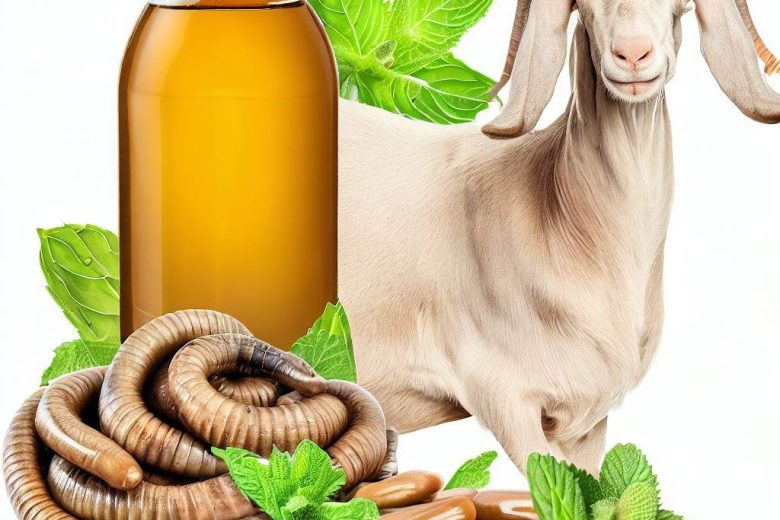Udder edema is a common condition observed in cows, characterized by swelling and fluid accumulation in the udder. It can significantly affect milk production and overall cow health.
Udder edema in cows is characterized by swelling and fluid accumulation in the udder, caused by hormonal imbalances, high sodium intake, and reduced lymphatic drainage. It presents with symptoms such as enlarged and tender udder, while treatment options include dietary adjustments, diuretics, massage and exercise, hormonal therapy, and antibiotics if necessary.
This article aims to explore the causes, symptoms, and treatment options for udder edema in cows, providing valuable insights for farmers and veterinarians.
Udder Edema in Cow: Causes, Symptoms & Treatment
What is udder edema In Cow?
Udder edema, also known as mammary edema, refers to the accumulation of fluid in the udder of cows. This condition typically occurs during the periparturient period, which is the time just before or after calving. It can affect both dairy and beef cows, but it is more commonly observed in high-producing dairy cows.
Read Also: Congested Udder in Cow [Causes, Symptoms & Treatment]
Prevalence in dairy cows
Udder edema is a prevalent condition in the dairy industry, especially in cows with a history of high milk production. The incidence tends to increase with age and parity, with older cows and those that have had multiple calves being more susceptible.
Differences between Udder edema and Mastitis in cows
Udder edema and mastitis are two distinct conditions that affect cows’ udders, although they can sometimes occur together. Udder edema refers to the swelling and fluid accumulation in the udder, usually caused by hormonal imbalances or sodium intake, and it does not involve an infection.
On the other hand, mastitis is an inflammatory condition of the udder caused by bacterial infection, resulting in symptoms such as swollen, hot, and painful udder, along with changes in milk consistency and quality.
Read Also: Udder Edema in Sheep [Causes, Symptoms & Treatment]
While udder edema can be managed with dietary adjustments, diuretics, and exercise, mastitis requires targeted antibiotic treatment to eliminate the bacterial infection.
Causes of Udder Edema In Cow (Diary Farm)
Hormonal imbalances
Hormonal imbalances, particularly an increase in estrogen levels, play a significant role in the development of udder edema. During the periparturient period, hormonal fluctuations occur as the cow prepares for calving and lactation. These imbalances can lead to increased blood vessel permeability and fluid retention in the udder.
High sodium intake
Excessive sodium intake through the diet can contribute to udder edema. Cows consuming diets high in sodium are at a higher risk of developing fluid accumulation in the udder. Sodium attracts water, leading to swelling and edema.
Reduced lymphatic drainage
Impaired lymphatic drainage can also contribute to udder edema. The lymphatic system helps remove excess fluid and waste products from tissues. If the lymphatic vessels in the udder are compromised or not functioning optimally, fluid accumulation can occur.
Read Also: Congested Udder in Sheep [Mastitis Causes, Symptoms & Treatment]
Genetic predisposition
Certain cow breeds and genetic lines may have a higher predisposition to developing udder edema. It is essential for breeders and farmers to be aware of the genetic factors that can influence the occurrence of this condition.
Symptoms of Udder Edema In Cow
Swelling and enlargement of the udder
The most apparent symptom of udder edema is swelling and enlargement of the udder. The affected udder may become significantly larger and firmer than usual.
Increased skin tightness
As fluid accumulates in the udder, the skin around it becomes stretched and tight. The udder may feel tense and firm to the touch.
Tenderness and pain
Cows with udder edema may exhibit signs of discomfort, including tenderness and pain when the udder is touched or manipulated. They may also exhibit signs of reduced mobility or reluctance to move.
Read Also: Coccidiosis in Goats [Causes, Symptoms, and Treatment]
Impact Of Udder Edema In Cow on Milk Production
Reduced milk yield
Udder edema can have a significant impact on milk production. The swelling and fluid accumulation in the udder can impede milk let-down and hinder milk flow, resulting in reduced milk yield.
Altered milk composition
The composition of milk from cows with udder edema may be altered. The fat, protein, and lactose content of the milk may deviate from normal levels, affecting the quality and market value of the milk.
Read Also: Albon for Goats [All You Should Know]
Diagnosing Udder Edema
To diagnose udder edema, a combination of physical examination, laboratory tests, and ultrasound imaging may be performed by a veterinarian.
Physical examination
The veterinarian will assess the cow’s udder for signs of swelling, tenderness, and skin tightness. They may also check for any secondary infections or lesions.
Laboratory tests
Blood samples may be taken to evaluate hormonal levels and rule out other underlying conditions that can cause udder edema.
Ultrasound imaging
Ultrasound imaging can provide valuable insights into the extent of fluid accumulation in the udder and help guide treatment decisions.
Read Also: Miscarriage In Goats & Sheep [Signs, Causes, and How to Prevent]
Treatment Options Of Udder Edema In Cow
Several treatment options are available for udder edema in cows, depending on the severity of the condition.
Dietary adjustments
Controlling the cow’s sodium intake by adjusting the diet can help manage udder edema. Low-sodium diets or diets with balanced electrolyte levels may be recommended.
Diuretics
Diuretic medications can help increase urine production and promote the elimination of excess fluid from the body. These medications are often prescribed in severe cases of udder edema.
Massage and exercise
Gentle massage and exercise can help improve lymphatic drainage and reduce swelling. Regular movement encourages fluid movement and can aid in the resolution of udder edema.
Read Also: Miscarriage in Cows [Signs, Causes, and How to Prevent]
Hormonal therapy
In some cases, hormonal therapy may be prescribed to rebalance hormone levels and reduce fluid retention in the udder.
Antibiotics (if necessary)
If udder edema leads to secondary infections, antibiotics may be prescribed to treat the infection and prevent further complications.
Preventive Measures For Udder Edema In Cow
Taking preventive measures can help reduce the incidence of udder edema in cows.
Proper nutrition and sodium control
Providing a well-balanced diet with controlled sodium levels can minimize the risk of udder edema. Consulting with a nutritionist can help formulate appropriate diets for cows at different stages of lactation.
Regular exercise and movement
Encouraging cows to exercise and move regularly promotes lymphatic drainage and overall cow health. Providing adequate space and encouraging physical activity can help prevent udder edema.
Genetic selection
Breeding cows from genetic lines that have a lower predisposition to udder edema can reduce its occurrence. Genetic selection for traits related to udder health and function can be beneficial.
Managing Udder Edema in Cows
Effective management practices can help minimize the impact of udder edema on cow health and milk production.
Farm management practices
Maintaining clean and comfortable housing conditions for cows can reduce stress and the risk of udder infections. Regular udder hygiene and proper milking techniques are crucial for preventing further complications.
Regular monitoring and early intervention
Regularly monitoring cows for signs of udder edema and implementing interventions at the earliest signs can prevent the condition from worsening. Close collaboration with a veterinarian is essential for effective management.
Can udder edema be fatal for cows?
No, udder edema itself is not typically fatal. However, if left untreated, it can lead to secondary infections or other complications that may pose a risk to the cow’s health.
Is udder edema contagious?
No, udder edema is not contagious. It is not caused by a pathogen and cannot be transmitted from one cow to another.
Can I milk a cow with udder edema?
Milking a cow with udder edema should be done with caution. Gentle milking techniques and monitoring for any signs of discomfort or infection are important. Consultation with a veterinarian is recommended.
How long does it take for udder edema to resolve?
The resolution time for udder edema can vary depending on the severity of the condition and the effectiveness of the treatment. In mild cases, it may resolve within a few weeks, while more severe cases may take longer.
Are there any natural remedies for udder edema?
While there are no specific natural remedies proven to cure udder edema, implementing proper nutrition, exercise, and stress reduction techniques can help manage the condition. Consulting with a veterinarian is advised for appropriate treatment options.
Conclusion
Udder edema is a common condition in cows, particularly high-producing dairy cows during the periparturient period. Understanding the causes, symptoms, and treatment options for udder edema is vital for farmers and veterinarians to ensure the health and productivity of their herds.
Implementing preventive measures, early detection, and appropriate treatment can help mitigate the impact of udder edema on milk production and cow well-being.




